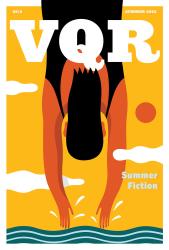 Joy seems hard to sustain these days if you’re paying close enough attention to the world around you. A somber mood with which to kick off a Summer Fiction issue, but it lands amid crises both familiar and new. Among them, close to home, and most visceral, is the grotesque refrain of another mass shooting in the US—in particular, the massacre at Robb Elementary in Uvalde, Texas, by a teenager who had egregiously easy access to military-grade weapons; and in the distance, Russia’s unending assault on Ukraine as it gnaws away at the country’s eastern front. Never mind the undercurrent of tension that colors the day-to-day navigation between the pandemic and this awkward endemic state, with the most vulnerable left to fend for themselves.
Joy seems hard to sustain these days if you’re paying close enough attention to the world around you. A somber mood with which to kick off a Summer Fiction issue, but it lands amid crises both familiar and new. Among them, close to home, and most visceral, is the grotesque refrain of another mass shooting in the US—in particular, the massacre at Robb Elementary in Uvalde, Texas, by a teenager who had egregiously easy access to military-grade weapons; and in the distance, Russia’s unending assault on Ukraine as it gnaws away at the country’s eastern front. Never mind the undercurrent of tension that colors the day-to-day navigation between the pandemic and this awkward endemic state, with the most vulnerable left to fend for themselves.
It seems only fair to acknowledge the fraught emotional frequencies where an issue like this might find many readers. The stories themselves, even the comic ones, are filled with a similar intensity of feeling: anguish and anger, suspicion, jealousy, futility, and no shortage of regret.
But this is one of the fundamental powers of art: to meet you where you are and articulate an otherwise inexpressible grief (or any emotion, for that matter) and bridge you toward a new clarity of feeling. That’s the divinity of the sublime, that it can be achieved across the spectrum of emotions, even in states of boredom, or frustration, or confusion. Even in the dizziness of the absurd, which writers have used to great effect to interpret the world around them.
The nonsense of the world. The absurdity of unending crisis. The baffling normalcy to which we are, apparently, returning. Reading through this issue, again and again, I kept coming back to a poem that speaks to ways of paying attention, and to how writers capitalize on lucky accidents in order to tame the incomprehensible. How one’s attunement can turn a fleeting idiosyncrasy—a snippet of conversation, a weird headline, a stranger’s body language—into some kind of investigation or improvisation. It might seem odd to focus on a poem in a Summer Fiction issue, but in the economy of its title, Dilruba Ahmed’s “Please Scream Inside Your Heart” seems to capture not only the current zeitgeist but also the peculiar talent that all the storytellers in this issue possess.
The poem grew out of a news story Ahmed read in the summer of 2020, about a Japanese amusement park’s effort to curb the spread of the coronavirus by asking visitors to refrain from screaming on its roller coasters. (In a video demonstration, with that phrase stamped on the screen, a pair of park executives stoically endure plummets and whiplash banks.) Light irony if not a little patronizing, since the whole point of this story was to smile at how the Japanese were scrambling to handle things, using a phrase that feels goofy to the ears of English speakers. In the poet’s mind, though, as the pandemic was clinching down, she sensed something more profound. “I was interested in the juxtaposition of the words scream and heart,” Ahmed told me. “I found it intriguing that juxtaposing those two words might create a source of tension. I felt compelled to pursue it and see: Where does this go?”
Be your own judge, but I can’t help but admire the way in which Ahmed uses a precisely restrained phrasing and imagery to stretch from the silliness of the first impression to the crystallization of deeper angst. The mood is dark while the act of the craft itself is elevating—the cathartic equation, one replicated in countless ways among the poems, stories, and essays in this issue. In a single paragraph or two-page passage or well-wrought line, the work herein goes beyond just technical achievement, bridging us with a range of feeling while we admire, and often marvel at, how that feeling is shaped.
Ahmed’s poem was written for that pandemic-centric summer, but it also speaks to new anxieties, and new grief. A depressing continuity, but within it is the gift of staying power. That gift is found in abundance here, in work that speaks to our pressurized time but is sure to be revisited, and celebrated.
— Paul Reyes






